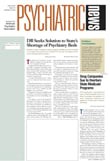Psychiatrist Francine Cournos, M.D., recalls her placement in a foster home in New York after her mother died nearly four decades ago. Her father had died several years earlier.
“It was traumatic. I had to move from my familiar neighborhood in the South Bronx, where I had relatives, friends, and teachers I knew, to a new home in a suburb of New York City. I felt I didn’t belong, and I was angry and rejecting of my foster care mother, which led to an unhappy relationship. But she allowed me to stay there five years until I was ready to move out,” Cournos told Psychiatric News.
Cournos, a professor of clinical psychiatry at Columbia University College of Physicians and Surgeons, describes her foster-care experience in her memoir, City of One, published by Penguin in 1999. “Although I had a stable foster-care situation and wasn’t abused or neglected, I needed long-term therapy to heal from my experience. I began to wonder how children in worse circumstances coped.”
National Initiative Launched
Cournos decided to contribute the perspective of a foster child to a national initiative to improve mental health and substance abuse services to foster children. The initiative, begun last March, is spearheaded by the American Academy of Child and Adolescent Psychiatry (AACAP) under the leadership of President Marilyn Benoit, M.D., and the Child Welfare League of America (CWLA).
According to the federal Administration on Children, Youth, and Families, about 565,000 children nationwide were in the foster-care system last year. An estimated 85 percent of them have an emotional or substance abuse problem or both, according to AACAP.
Cournos serves on the AACAP/CWLA Committee on Foster Care and Adoption, which has produced two policy statements and is developing a third one on treatment. The first statement on mental health values recommends that foster children have a voice in decisions affecting their mental and emotional health, including their placements.
“I felt completely helpless to control my circumstances, which made me angry and resistant to attempts by adults to help me. Listening to the foster-care child’s perspective will help him or her feel empowered,” said Cournos.
The mental health values statement also recommends that foster care children have the right to refuse mental health or substance abuse services unless they are a danger to themselves or others and the right to maintain contact with siblings and relatives.
Cournos also serves on the AACAP/CWLA foster-care subcommittee that is compiling tools to screen and assess foster children for mental health and substance abuse needs. The subcommittee has made the following recommendations:
• All children entering the child welfare system should be screened within 24 hours to determine if an urgent need for services exists.
• A screening tool should be used to measure a child’s level of distress about being removed from family members and whether supportive counseling is needed
• Comprehensive mental health and substance abuse assessments should be conducted for all foster children and their families within 60 days of the child’s placement, during transitions to other placements, and when children leave the foster-care system.
Implementing Recommendations
APA is one of 15 national organizations participating in the initiative and several planning conferences being held in Washington, D.C. Among the other organizations are the American Academy of Pediatrics, American Bar Association, Children’s Defense Fund, National Foster Parents’ Association, National Mental Health Association, National Association of Social Workers, and Advocates for Children’s Services.
APA’s immediate past president, Richard Harding, M.D., who attended the first conference last June, told Psychiatric News that he was impressed by the stature of the participating organizations and individuals.
Steve Hornberger, M.S.W., director of behavioral health at CWLA, remarked in an interview, “It is unprecedented for so many groups with an interest in the child welfare system to meet and agree on the design and delivery of mental health and substance abuse services.”
Federal funding is being sought to train social workers and other frontline workers to use the new screening and assessment tools. Funding will also be sought for research projects to evaluate the mental health of foster children and the outcomes of new approaches to providing mental health and substance abuse services, said Hornberger.
Federal agencies have expressed interest in the initiative, including the National Institute of Mental Health, Substance Abuse and Mental Health Services Administration, and Administration of Children, Youth, and Families, said Hornberger.
Benoit told Psychiatric News that “legislative actions and legal mandates may be needed to increase funding for these additional mental health services. All organizations participating in the initiative will be asked to urge local, state, and federal policymakers to adopt budgets to fund needed screening, assessment, and treatment required by some children and adolescents in foster care.”
Every state receives some federal Medicaid funding and by law is required to provide services under the Early and Periodic Screening, Diagnosis, and Treatment Program (EPSDT) to eligible children, which includes most foster children. However, many states face budget crises and have frozen or cut Medicaid EPSDT spending by mental health departments.
Marvin Southard, D.S.W., director of the Los Angeles County Department of Mental Health, told Psychiatric News that the state legislature and county board of supervisors recently told him not to expand his mental health program further. It had begun providing services to foster children and their families.
The AACAP/CWLA Foster Care Mental Health Values Subcommittee policy statement and the AACAP/CWLA Policy Statement on Mental Health and Substance Abuse Screening and Assessment of Children in Foster Care are posted on the AACAP Web site at www.aacap.org/publications/policy/collab01.htm and www.aacap.org/publications/policy/collab02.htm. ▪

